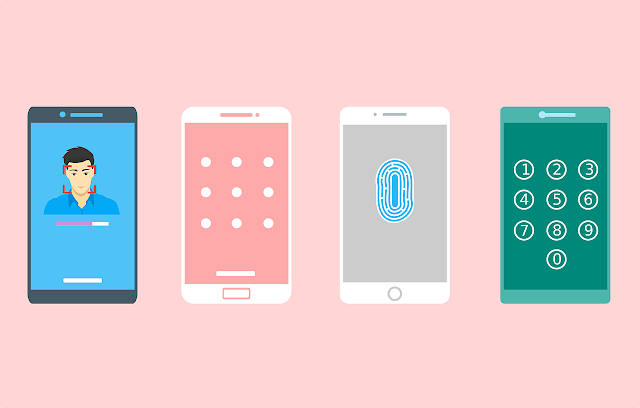 |
| Hack-proof smartphone, *winks* |
Level 1:-
Create Strong Passwords: This is a common negligence among smartphone users, where some people use passwords such as – 1234, abcd1, Passwords. These are all wrong password settings. Here are they different techniques to step up your password privacy attitude.
- Choose Hard to guess passwords:
It might be easier to remember secure passwords, but passwords that rely on things such as your date of birth, the accurate sequencing of digits in your phone number or anything else that is readily associated are never a good sign of a strong password. Abstain from using passwords like birthdays, anniversaries or serial number sequences. They are the most obvious and are likely to be the first that hackers will try. Opt for a sophisticated course that involves an uppercase letter, number and symbol. The more complicated you make the chain, the more secure your password.
It might be easier to remember secure passwords, but passwords that rely on things such as your date of birth, the accurate sequencing of digits in your phone number or anything else that is readily associated are never a good sign of a strong password. Abstain from using passwords like birthdays, anniversaries or serial number sequences. They are the most obvious and are likely to be the first that hackers will try. Opt for a sophisticated course that involves an uppercase letter, number and symbol. The more complicated you make the chain, the more secure your password.
- Never use Same Passwords for all your online accounts:
Never!!!, that’s the keyword there. Protect your smartphone by using different passwords for each online account accessed by your phone. You can as well create a hidden or secret note on your smartphone and store up your different passwords there like I do; *winks*.
Never!!!, that’s the keyword there. Protect your smartphone by using different passwords for each online account accessed by your phone. You can as well create a hidden or secret note on your smartphone and store up your different passwords there like I do; *winks*.
- Update your phone’s passwords often:
Changing your passwords often to keep your phone secure might also help resist attackers. While you need not update them daily, figure out when would be a good time to swap passwords and create something new.
Changing your passwords often to keep your phone secure might also help resist attackers. While you need not update them daily, figure out when would be a good time to swap passwords and create something new.
- Voice Passwords can be Handy:
Password protecting your voicemail will ensure that ill-willed predators don’t remove any private messages. Many phones come with a voicemail password already set by default. However, it tends to be very easy to guess. If yours has this feature change it immediately to a password known only to you.
Password protecting your voicemail will ensure that ill-willed predators don’t remove any private messages. Many phones come with a voicemail password already set by default. However, it tends to be very easy to guess. If yours has this feature change it immediately to a password known only to you.
💡 7 Tips to protecting your privacy on the Web against attacks
Level 2:-
Keep up to date – and don’t open up holes yourself: –
Th Guardian wote- When it comes to protecting yourself against hackers, step one is always to install software updates as soon as they become available: that’s as true on smartphones as it is on computers.
Adopt a proactive protection mindset: Start by accepting that sometimes there are people in your life who might want to hack into your personal details for malicious reasons. Failed relationships, people who may not like something you have said and friends who have without cause turned unfriendly may all have something to gain from your personal phone or computer. Keep such matters from happening by:
💡 Save a backup copy of important correspondence: Any attached files or photos you have on your smartphone should be backed up on your PC or laptop.
💡 Think, don’t assume: Train yourself to stop using your phone for confidential information of any sort and any sensitive information you receive, delete it immediately after reading it, or back it up elsewhere.
Level 3:-
Be careful of what you install
Make it hard for intruders to get in
Make sure your phone is locked when not in use: both Android and iOS can be set to require a six-digit passcode. You can ultimately employ the very safe strategy of setting up a backdoor in your Windows in case of an attack.
Beware Of Open Wifi Networks😖
As per written by the Guardian. We all know there’s a risk involved in using an open wireless network. But you may not realise how severe it is:
💡 Public Hotspots: The Reasons why you need stay away from them
So, those were smart techniques to handling your smartphone away from intruders and attacks. Sure, we have missed some methods which you might have been using. As usual, let us know in the comment section.

I never realized it was so easy for hackers to hack into a mobile phone until I read this! Apparently, I've got make sure I'm more careful about what I download, etc. Thanks for the info!
Hy Kristi,
It's pretty that easy to get hacked but never difficult getting yourself secured (at least in some way). Public WiFi networks represents another target rout for them. Thanks for checking us out, feel free to share with pals.